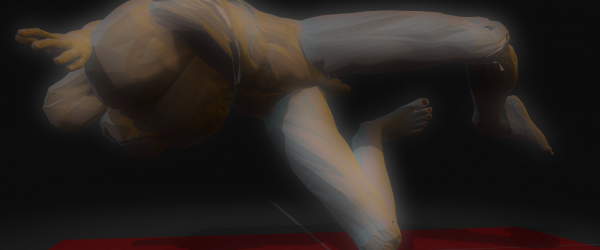
Interview with Alan Sondheim
Artists, Interviews, UncategorizedAlan Sondheim is an artist you must follow. He tackles the frontiers of reality and through his work we can understand what is possible and what we really can do there. His magnum opus is Internet Text. He started work on the project 1994. It’s a meditation on various subjects, including philosophy, psychology, language, body, and virtuality.
Born in Wilkes-Barre, Pennsylvania. He holds a B.A. and M.A. in English from Brown University. He lives with his partner, Azure Carter, in Providence, Rhode Island. You can read the rest here.
***
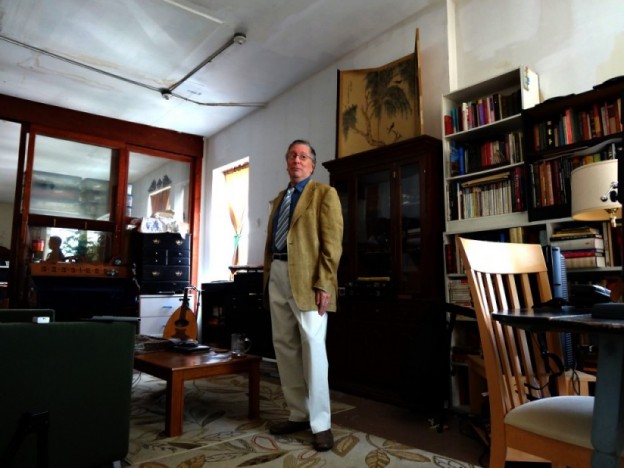
Volodymyr Bilyk: Can you describe – step by step – your more or less ordinary working session?
Alan Sondheim: I’ll try. I’m not sure I have an ordinary working session; I work every day, but the timing is deeply chaotic – for one thing I have bad insomnia and anxiety, and given a night’s choppy sleep, I work around periods of exhaustion. I have a neurotic compulsion to produce constantly, however, and there are periods of time which work best for me. In the afternoons and early evenings, I’ll practice music, as well as work out musical ‘situations’ for various instruments. These are almost all acoustic, with straight pegs for the stringed ones; I have to be careful with tuning and the humidity. I practice with both bowing and right-hand fingering, working with as much difficulty as I can; I also work on left-hand technique, which is critical for unfretted instruments (hasapi, viola, violin, oud, etc.). Finally, I work with wind instruments – daily with shakuhachi, including no-holes shakuhachi (which are just tubes with a shakuhachi mouthpiece), and every 2-3 days, with clarinet or alto clarinet. Embrochure is critical with all of these, and hard for me.
Every day I also write, and if I can, work with images or video in virtual worlds. I’m pursuing my philosophical interests (which I think determine everything I do), and I try to push my writing to the limit, and experiment with the ‘edgespace’ of virtual worlds as well. I use some older perl programs I wrote, as well as linux/unix scripting for my texts, often culling from all of my work – for example, I could enter a simple command like “grep -h “sphere ” texts/*.txt > zz” to find all the examples of “sphere ” in my textual work to date (about 35 megabytes ascii); the result can then be modified in any number of ways to produce a coherent work, literally a textual body, that contains the germs of a phenomenology on a particular subject, enhanced by repetition, cuts, jump-cuts, elisions, etc. If and when I put the work up, I’ll combine it with at the least one or more still images, and often video as well, so that the philosophical extends into a kind of experience that augments, bypasses, or dilutes/sidetracks, what’s produced by the words themselves.
I have a number of laptops and gaming machines here; I use Windows 10 (for the most part, also linux), and log into my linux/unix/bsd account at panix, where I work with a text-based terminal environment, for me the ‘purest’ languaging (and its restriction) of all. This frees me incredibly to write. When I’m out, I work in a small Win10 tablet or a Nook with a terminal program; I’m really comfortable with linux as a subset or window within other operating systems. When I’m out, at a coffee shop for example, I feel amazingly free to write – the difficulty of the virtual disappears and it’s almost like having a conversation at my fingertips.
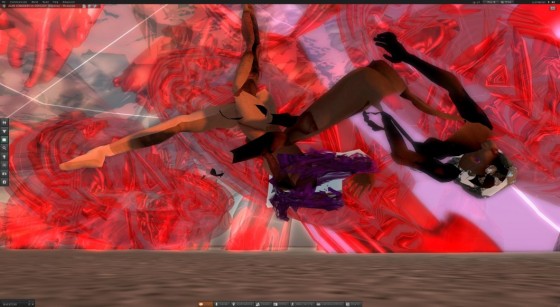
When I’m home, I’ll often have soccer on in the background; I’m a Barcelona fan, but now Eibar as well, and it’s calming for me. I also watch a lot of BBC news, and, when I can get it, Al Jazeera. I drink coffee incessantly, nothing else; it keeps me going. I try to write a minimum of 43 lines a day, but with the textual culling I do, the texts can reach 100 lines or more – with the philosophical work, much longer. I feel always I have very little time to live (I was told I was going to be dead by 25), so I produce as often and intensely as I can, so as not to leave anything undone. My work is aphoristic, choppy, intense, edgy, etc. I write sexual pieces as well but have to be careful not to let myself be too aroused, or the text veers into typical territory.
I read constantly, mostly philosophy, cosmology, particle physics, Buddhist texts, and logic/mathematics, to the extent I can understand what I’m reading; many of my books are above me, and I supplement them with video lectures, etc. I want to know as much about the universe as I can, and I read in these areas daily. I also read grammars and lexicons for non-Indo-European languages, to extend my knowledge of syntax/semantics outside the usual. Being Jewish, I’ve also attempted Hebrew, and a very little Assyrian, Babylonian, etc. (On the other hand, there’s Hittite, which is fascinating); Ellen Zweig and I, years ago, did some classical Chinese translating as well. On top of these, I’m also ransacking the past, looking at various strange 18th-early 19th century books in English that resonate with digital/virtual phenomenology. All of this is just reading, of course.
Finally, I have a general tendency (being seriously depressive at times) to look horror in the face; hence, my writing stemming from thinking about absolute terror, torture, global organism extinctions, scorched earth policies, and so forth. I give talks on these, and I’m always frightened of these talks – I’m giving one in Pennsylvania, for example, as a keynote for a new new media program, and I’ve been working on it for a couple of months. I want to deal with anguish, with inconceivable despair, and what one can do in these situations; this kind of work gives me nightmares on top of the insomnia, but for me, it’s a form of politics without politics – I don’t want to deal for example with the origins or history of ISIS, but the confrontation ISIS engenders in people who are fleeing, who are about to be killed, and so forth. For me, this is where the heart of being lies, within the human sphere – and of course the human sphere itself is embedded within cosmology, particle physics etc. But the human sphere is fundamentally abject, tawdry, always already falling apart, and that’s where my work lies; that’s what I think about.
And finally, finally (far more than you need), when I’m falling asleep, I tend to try and figure out simple topological/3d-4d figures, and how they’re interrelated – not mathematically (I don’t know have the talent, knowledge, or expertise for that), but in terms of visualizations; when all else fails, I’ll get up, and try to work in the other room, so as not to wake Azure. And I have to say, Azure’s at the heart of all of this; she keeps me sane, to the extent that I may be sane, she gives me a sense of beauty and grace that otherwise is pretty much foreign to me…
***
The "Internet Text" currently constitutes around 100 files, or 10,000 printed pages. It began in early 1994, and has continued as an extended meditation on cyberspace, expanding into 'wild theory' and literatures, symptomologies of the edge. Almost all of the text is in the form of short- or long-waves. The former are the individual sections, written in a variety of styles, at times referencing other writers/theorists. The sections are interrelated; on occasion emanations are used, avatars of philosophical or psychological import. These also create and problematize narrative substructures within the work as a whole. Such are Susan Graham, Julu, Alan, Jennifer, Azure, and Nikuko in particular. The long-waves are fuzzy thematics bearing on such issues as death, sexuality, virtual embodiment, the "granularity of the real," physical reality, computer languages, and protocols. The waves weave throughout the text; the resulting splits and convergences owe something to phenomenology, programming, deconstruction, linguistics, philosophy and prehistory, as well as the domains of online worlds in relation to everyday realities. Overall, I'm concerned with virtual-real subjectivity and its manifesta- tions. I continue working on a cdrom of the last eight years of my work (Archive), as well as a series of 3d animation and other videos, some of which are on cdrom. I have used MUDS, MOOS, talkers, perl, d/html, qbasic, linux, emacs, vi, CuSeeMe, Visual Basic, etc., my work tending towards embodied writing, texts which act and engage beyond traditional reading practices. Some of these emerge out of performative language - soft-tech such as computer programs which _do_ things; some emerge out of interferences with these programs, or conversa- tions using internet applications that are activated one way or another. And some of the work stems from collaboration, particularly video, sound, and flash pieces. There is no binarism in the texts, no series of definitive statements. Virtuality is considered beyond the text- and web-scapes prevalent now. The various issues of embodiment that will arrive with full-real VR are already in embryonic existence, permitting the theorizing of present and future sites, "spaces," nodes, and modalities of body/speech/community. The texts are roughly in the order written; the last-entered at the moment is nd. They may be read in any order, and distributed in any medium; please credit me. I would appreciate in return any comments you may have.
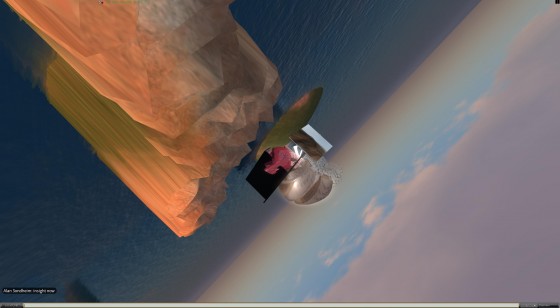
VB: Do you use cryptography methods in your writing?
AS: Sometimes; I’ve worked with steganography for example and simple ciphers; I’ve also produced pieces using substitution codes that get so blighted as to be almost impenetrable. If you code many -> one, for example, you can’t reverse. Let’s say is a simple example, [A-Z,a-z] -> 3; then you might have a line like 333 333333333333 3. 333… – and this is illegible, the 3’s marking only the length of the words… but that’s fascinating on its own level, relating to the cold death of the universe…
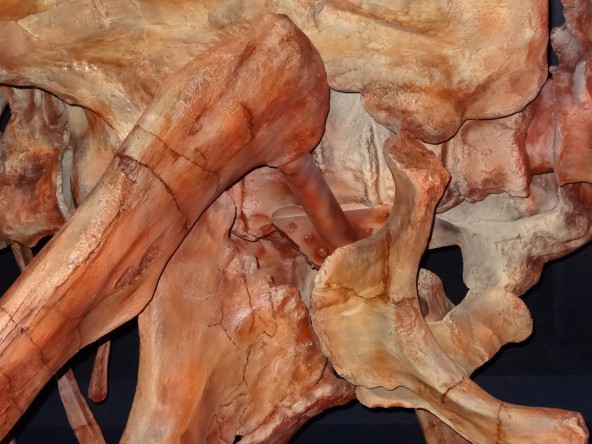
AS: That writing is real-time, that it deviously seems to forestall death, that it creates a vast and expanding habitus, that it’s everywhere and nowhere simultaneously, that I write for others who may or may not come to the table…
AS: I’m not sure what you mean here. With video – I’ve shot underneath a tornado, in violent winds from Hurricane Sandy, in blizzards, etc. – these conditions fascinate me and I have to of course be careful with cameras. With audio, I’ve played in places such as the Inclined Plane Railway in Johnstown, PA (I’m still here, now, after a conference); with photography, film, and video, I’ve done a lot of shooting at the burning mountain outside Wilkes-Barre, PA, and have followed firefighters into burning buildings in Los Angeles. There are always these things… But writing or music – these should always been adventurous in themselves. Then there is sexual writing/video/photography/etc. I did off and on, almost none now – and the difficulty there can be keeping arousal under control, seeing this work as work, with pleasure taking a back seat.
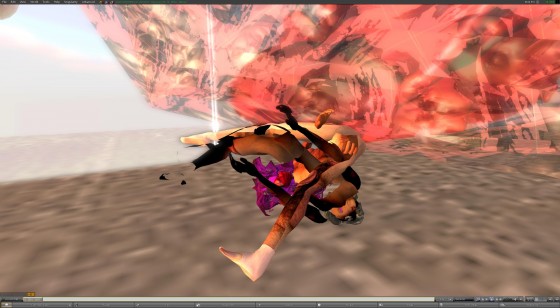
VB: Can you describe how do find a new ways of expressing ideas – the process itself? Where do you start and when you know it’s time to stop? What tools do you use?
AS: I use any and all available tools, anything I can find; most of the videos are short because they’re instances or snapshots of productions, they’re states-of-affairs of a particular sort. And I read constantly, math, science, some philosophy, poetry/poetics, new media things as well, and these feed into what I’m doing. I look for limit cases, pushing software or comprehension to the edge of legibility; pushing virtual world behavior to the edgespace of the world so that anomalies appear. The main tools are some limited programming, various virtual worlds (including one that resides on my computer alone), musical instruments, some Supercollider programs Luke Damrosch wrote for me, and so forth.
VB: What do you think about multiple versions of one piece of work – todat any piece of art can be represented in a various ways – as a recording, as a video, as a collage, image-macro, a description, a comment, reference and so on. Is this multiplying useful for an artist – what it can bring and where it can lead?
AS: I can’t answer this; it depends on the artist. I try to move on after everything I do, but other people refine. This doesn’t really apply to me. And of course a piece of art can’t be represented, say, as a collage, and then as a comment – these are different media; only intermedia connecting these things might apply. You should ask someone else I think.
VB: What do you think about consciously using old ways of expressions in order to constrain and reorganise yourself?
AS: I’m not really interested, honestly, in ‘ways of expression,’ and have no interest in constraining myself; the content of the work, its phenomenological or philosophical position, motivates me. I’m not sure what ‘reorganize myself’ might me; again, I don’t think it applies to me. I do work, musically, with issues of virtuosity, but that’s because playing as such leads me somewhere else, to new territories. That said, I’m also fascinated by instruments like guqin and hegelungs that are culturally embedded, that I have to approach with a sense of humility; I have to understand them.
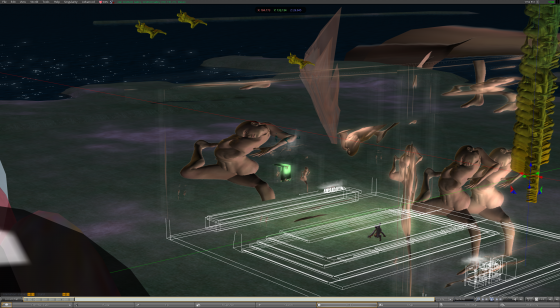
VB: What do you think about a concept “to boldly go where no one has gone before” – is it relevant in age of Internet? Is it necessary to do something new for sake of doing something new or is it important to do the right thing in the right time?
AS: I hope my work is new and in some areas maybe even ground-breaking, but that’s not for me to decide – the same goes for its relevance. Every day there are new digital/electronic wonders, new discoveries in particle physics, mathematics, cosmology; of course these are relevant. You might look at Bourdieu’s Distinction here – what’s relevant depends on habitus, community, communality, etc. And the second question – Is it necessary to do something new? – for me it is; I don’t want to repeat myself or the past in general. But hardly for the “sake of doing something new” – what’s the point of that? And I don’t know what either the right thing or right time might be; I don’t think this applies to me. I do think that failure is important; it leads to new ways of thinking, to reconsideration of what one is doing.
VB: What do you think about distracting activities?I mean – things you do in order to not to do what you usually do?
AS: I have constant distractions, and I often work through them, usually watching La Liga football for example. A lot of time has to be down time or time for music practice, which I can do while multi-tasking; then there’s necessary time for background reading. But often I’ll do things to clear my mind, searching for fungi, birding, etc. when I have a chance.
VB: Have you ever experienced a so-called writer’s block? By the way – isn’t it a stupid concept that exists only to provoke funny answers?
AS: I haven’t experienced it but it’s not a stupid concept – what makes you think that? I know people, including well-regarded theorists for example, who suffer from this, who have a great deal of difficulty expressing themselves, to the point of real despair.
VB: Have ever experienced the need to be somebody else? I mean something completely different and devoid of any of your usual ambitions.
AS: No; I don’t like myself, but I’ve never wanted to be anyone else either.
***






















